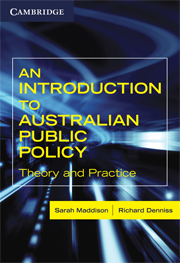Book contents
- Frontmatter
- Contents
- List of figures
- List of tables
- List of case studies exercises, and original contributions
- Foreword
- PART 1 Policy and theory
- PART 2 Policy in practice
- 7 Who does policy?
- 8 The nuts and bolts of policy work: advice, implementation and evaluation
- 9 The role of the media in setting the policy agenda
- 10 Consulting with stakeholders
- 11 Research and policy
- 12 Communication, ethics and accountability
- References
- Index
- References
12 - Communication, ethics and accountability
- Frontmatter
- Contents
- List of figures
- List of tables
- List of case studies exercises, and original contributions
- Foreword
- PART 1 Policy and theory
- PART 2 Policy in practice
- 7 Who does policy?
- 8 The nuts and bolts of policy work: advice, implementation and evaluation
- 9 The role of the media in setting the policy agenda
- 10 Consulting with stakeholders
- 11 Research and policy
- 12 Communication, ethics and accountability
- References
- Index
- References
Summary
In the final chapter of this book we will focus on some key areas of policy work that often have wider implications. The first is the question of communication, both internally (in the form of a policy briefing exercise) and externally (to the media and the wider public). The second issue we consider is the importance of professional ethics and public accountability in policy work. O'Faircheallaigh et al suggest that public accountability regimes have two ethical dimensions: political accountability, meaning that responsible bodies should be answerable for the actions and inactions, and administrative codes of ethics, which require that these bodies observe codes of behaviour both publicly and internally. These two dimensions are related to one another but cannot necessarily, or neatly, be derived from one another, hence they are dealt with separately below (O'Faircheallaigh et al. 1999: 226).
Communication in policy work
Communication is essential to good policy work. Whether the need is to communicate advice to a minister, a decision to the general public, the findings of policy research or the outcomes of a consultation process, good policy needs good communication, both inside and outside government. Such communication takes many forms, from the policy brief and media release we discuss here, to research reports, oral presentations, media ‘grabs’ and appearances before committees of inquiry. Communication is also essential to democracy and therefore to democratic policy making and has become inseparable from how governments operate. As Sally Young argues, communication:
is a dimension of every action or decision a government takes, from the way in which policies are made, promoted and enacted, to how government is organised and the relationships it builds with citizens, the media and other groups such as business and community organisations
(2007: xxiii).[…]- Type
- Chapter
- Information
- An Introduction to Australian Public PolicyTheory and Practice, pp. 234 - 251Publisher: Cambridge University PressPrint publication year: 2009



